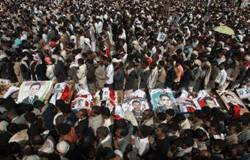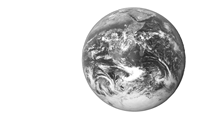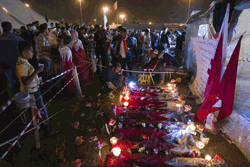|
Published on Fri, 2011-04-15 07:56
Source: Article by Edwin Agola (The Guardian) |
|
Published on Fri, 2011-04-15 07:53
Source: Ma’an News Unknown assailants broke into the offices of the union of agricultural work committees in Ramallah on Tuesday at dawn, stealing servers and computers and ransacking files. |
Published on Fri, 2011-03-25 11:23
Source: Human Rights Information and Training Center Dozens of common citizens have been killed by Yemeni forces since the Youth Revolution broke out in February 11, according to the Human Rights Information and Training Center, national focal point of Social Watch in this arab country. |
Published on Thu, 2011-03-17 12:42
By Roberto Bissio Environmentalists, economists, feminists and social activists from all over the world, after many years of criticizing governments are now calling for States to be strengthened as the only way to save the planet, threatened by a whole series of crises in climate, water, food and finances. On Monday, March 7th, sixteen members of the self-appointed Reflection Group on global development perspectives formulated a call to “change the mindset" about environmental and economic problems. |
Published on Wed, 2011-03-16 07:53
The United Nations, the Arab League and the international community in general must intervene to stop the massacre that Bahrain demonstrators and activist are currently suffering, warned this Wednesday the local civil society organizations. The Bahraini opposition considers the Saudi and Emirates military contingents as occupation forces. Eurostep, the Arab NGO Network for Development (ANND) and Social Watch asked the UN secretary-general, Ban Ki-moon, and the High Representative of the EU for Foreign Affairs, Catherine Ashton, to call Bahraini authorities for an immediate end to the violence. |
SUSCRIBE TO OUR NEWSLETTER





